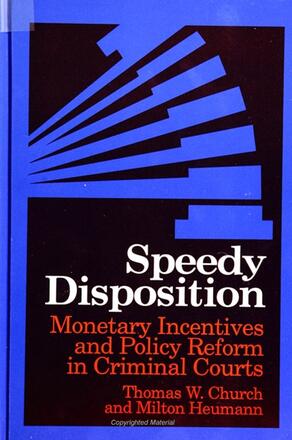
Speedy Disposition
Monetary Incentives and Policy Reform in Criminal Courts
Alternative formats available from:
Description
Monetary incentives are increasingly seen as attractive alternatives to strict regulatory approaches for achieving objectives. This book examines one of the most ambitious attempts to use monetary incentives in the criminal justice system: New York City's $8. 25 million Speedy Disposition Program (SDP). New York City officials introduced SDP as an incentive scheme to encourage the city's six District Attorneys to accelerate the disposition of those criminal cases that most contributed to the city's chronic jail overcrowding problem. Substantial financial rewards would be given to those DAs' offices that managed to dispose of their oldest felony cases, those cases involving "long-term detainees. "
The implementation of SDP in New York City — and the responses of the city's district attorneys to it — provides fascinating tales that teach much about innovation in criminal justice, about new approaches to court reform and delay reduction, and more generally, about the uses of monetary incentives as policy tools. Further, the program provides a rich source for analysis of the considerations that should go into the design of incentive programs, and into the contextual factors that argue for their applicability in other areas.
Thomas W. Church is Associate Professor in the Department of Political Science at Rockefeller College of Public Affairs and Policy, State University of New York at Albany Milton Heumann is Professor in the Department of Political Science at Rutgers University.
Reviews
"The authors have introduced me to a policy area — monetary incentives. The novelty of the concept alone in the judicial process makes this an important book. The discussion on monetary incentives is crisp and informative and creates an appropriate framework for the SDP story. What is startling and most insightful is the dissection of the rationale of the Manhattan program's success. The book offers some very useful information about the drawbacks of crash programs versus incremental changes and the insights regarding the limited room for organizational maneuvers when there are multiple goals is most useful. " — Marvin Zalman, Wayne State University